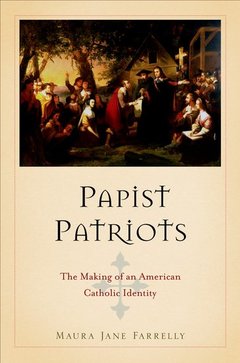Papist Patriots The Making of an American Catholic Identity
Langue : Anglais
Auteur : Farrelly Maura Jane

"Maura Farrelly has a fresh and challenging perspective on the Americanization of Roman Catholicism, one that tracks its origins to early Maryland. Papist Patriots bears close reading by all students of American history and religion." -- Christine Leigh Heyrman, Professor of American History, University of Delaware "Distinguished by impressive research and a well-written, lively narrative, Farrelly's study will change the way historians think about Catholics in colonial America. The author argues that the foundation for the making of an American Catholic identity rests in Maryland's 1649 Act of Religious Toleration. Over time, Maryland's Catholics became more American than English so that by the 1770s these Papists had become ardent Patriots. By endorsing the republicanism and individualism of the independence movement they created an American Catholic identity that has endured into the twenty-first century." -- Jay P. Dolan, Professor Emeritus of History, University of Notre Dame Many historians have noted the role that anti-Catholicism played in stirring up animosity against the king and Parliament in the early days of the Revolution. Yet, in spite of the rhetoric, Maryland's Catholics supported the independence movement more enthusiastically than their Protestant neighbors to the point where the support for the war in predominately Catholic Maryland may even have been greater than that exhibited by the residents of Massachusetts. Not only did Maryland's Catholics embrace the idea of independence, they also embraced the individualistic, rights-oriented ideology that defined the Revolution, even though theirs was a communally-oriented denomination that stressed the importance of hierarchy, order, and obligation. Catholic leaders in Europe made it clear that the war was a "sedition" worthy of damnation, even as they acknowledged that England had been no friend to the Catholic Church. So why, then, did "papists" become "patriots?" Farrelly finds that the answer has a long history, one that begins in England in the early seventeenth century and gains momentum during the nine decades preceding the American Revolution, when Maryland's Catholics lost a religious toleration that had been uniquely theirs in the English-speaking world, and were forced to maintain their faith in an environment that was legally hostile and clerically poor. This experience made Maryland's Catholics the colonists who were most prepared in 1776 to accept the cultural, ideological, and psychological implications of a break from England.
Introduction. Chapter 1: The English Origins of American Catholicism. Chapter 2: Prescience, Pluralism, and Profit. Chapter 3: Inconsistencies and Consequences. Chapter 4: Catholic Commitment in an Inhospitable Climate. Chapter 5: The Inconsistency of Intolerance. Chapter 6: Papists Become Patriots.
Assistant Professor of American Studies and Director of the Journalism Program, Brandeis University
Date de parution : 01-2012
Ouvrage de 324 p.
23.6x15.5 cm
© 2024 LAVOISIER S.A.S.



